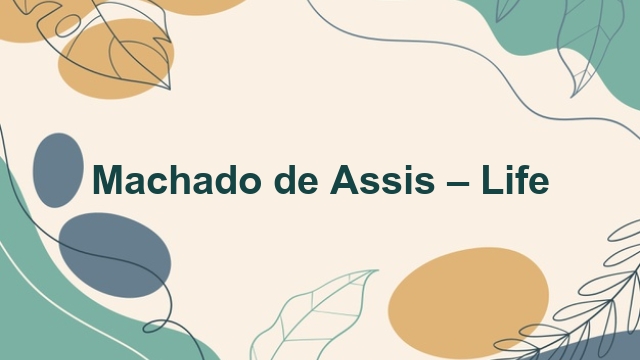
Machado de Assis – Life
End of time. Ahasverus, seated upon a rock, gazes for a long while upon the horizon, athwart which wing two eagles, crossing each other in their path. He meditates, then falls into a doze. The day wanes.
Ahasverus. I have come to the end of time; this is the threshold of eternity. The earth is deserted; no other man breathes the air of life. I am the last; I can die. Die! Precious thought! For centuries of centuries I have lived, wearied, mortified, wandering ever, but now the centuries are coming to an end, and I shall die with them. Ancient nature, farewell! Azure sky, clouds ever reborn, roses of a day and of every day, perennial waters, hostile earth that never would devour my bones, farewell! The eternal wanderer will wander no longer. God may pardon me if He wishes, but death will console me. That mountain is as unyielding as my grief; those eagles that fly yonder must be as famished as my despair. Shall you, too, die, divine eagles?
Prometheus. Of a surety the race of man is perished; the earth is bare of them.
Ahasverus. I hear a voice…. The voice of a human being? Implacable heavens, am I not then the last? He approaches…. Who are you? There shines in your large eyes something like the mysterious light of the archangels of Israel; you are not a human being?…
Prometheus. No.
Ahasverus. Of a race divine, then?
Prometheus. You have said it.
Ahasverus. I do not know you; but what matters it that I do not? You are not a human being; then I may die; for I am the last and I close the gate of life.
Prometheus. Life, like ancient Thebes, has a hundred gates. You close one, and others will open. You are the last of your species? Then another better species will come, made not of clay, but of the light itself. Yes, last of men, all the common spirits will perish forever; the flower of them it is which will return to earth and rule. The ages will be rectified. Evil will end; the winds will thenceforth scatter neither the germs of death nor the clamor of the oppressed, but only the song of love everlasting and the benediction of universal justice….
Ahasverus. What can all this posthumous joy matter to the species that dies with me? Believe me, you who are immortal, to the bones that rot in the earth the purples of Sidonia are worthless. What you tell me is even better than what Campanella dreamed. In that man’s ideal city there were delights and ills; yours excludes all mortal and physical ailments. May the Lord hear you! But let me go and die.
Prometheus. Go, go. But why this haste to end your days?
Ahasverus. The haste of a man who has lived for thousands of years. Yes, thousands of years. Men who existed scarcely scores of them invented a feeling of ennui, tedium vitae, which they could never know, at least in all its implacable and vast reality, because it is necessary to have journeyed through all the generations and all the cataclysms to feel that profound surfeit of existence.
Prometheus. Thousands of years?
Ahasverus. My name Is Ahasverus; I dwelt in Jerusalem at the time they were about to crucify Christ. When he passed my door he weakened under the burden of the beam that he carried on his shoulders, and I thrust him onward, admonishing him not to stop, not to rest, to continue on his way to the hill where he was to be crucified…. Then there came a voice from heaven, telling me that I, too, should have to journey forever, continuously, until the end of time. Such was my crime; I felt no pity for him who was going to his death. I do not know myself how it came about. The Pharisees said that the son of Mary had come to destroy the law, and that he must be slain; I, ignorant wretch, wished to display my zeal and hence my action of that day. How many times have I seen the same thing since, traveling unceasingly through cities and ages! Whenever zealotry penetrated into a submissive soul, it became cruel or ridiculous. My crime was unpardonable.
Prometheus. A grave crime, in truth, but the punishment was lenient. The other men read but a chapter of life; you have read the whole book. What does one chapter know of the other chapter? Nothing. But he who has read them all, connects them and concludes. Are there melancholy pages? There are merry and happy ones, too. Tragic convulsion precedes that of laughter; life burgeons from death; swans and swallows change climate, without ever abandoning it entirely; and thus all is harmonized and begun anew. You have beheld this, not ten times, not a thousand times, but ever; you have beheld the magnificence of the earth curing the affliction of the soul, and the joy of the soul compensating for the desolation of things; the alternating dance of Nature, who gives her left hand to Job and her right to Sardanapalus.
Ahasverus. What do you know of my life? Nothing; you are ignorant of human existence.
Prometheus. I, ignorant of human life? How laughable! Come, perpetual man, explain yourself. Tell me everything; you left Jerusalem …
Ahasverus. I left Jerusalem. I began my wandering through the ages. I journeyed everywhere, whatever the race, the creed, the tongue; suns and snows, barbarous and civilized peoples, islands, continents; wherever a man breathed, there breathed I. I never labored. Labor is a refuge, and that refuge was denied me. Every morning I found upon me the necessary money for the day … See; this is the last apportionment. Go, for I need you no longer. (He draws forth the money and throws it away.) I did not work; I just journeyed, ever and ever, one day after another, year after year unendingly, century after century. Eternal justice knew what it was doing: it added idleness to eternity. One generation bequeathed me to the other. The languages, as they died, preserved my name like a fossil. With the passing of time all was forgotten; the heroes faded into myths, into shadow, and history crumbled to fragments, only two or three vague, remote characteristics remaining to it. And I saw them in changing aspect. You spoke of a chapter? Happy are those who read only one chapter of life. Those who depart at the birth of empires bear with them the impression of their perpetuity; those who die at their fall, are buried in the hope of their restoration; but do you not realize what it is to see the same things unceasingly,—the same alternation of prosperity and desolation, desolation and prosperity, eternal obsequies and eternal halleluiahs, dawn upon dawn, sunset upon sunset?
Prometheus. But you did not suffer, I believe. It is something not to suffer.
Ahasverus. Yes, but I saw other men suffer, and in the end the spectacle of joy gave me the same sensations as the discourses of an idiot. Fatalities of flesh and blood, unending strife,—I saw all pass before my eyes, until night caused me to lose my taste for day, and now I cannot distinguish flowers from thistles. Everything is confused in my wearied retina.
Prometheus. But nothing pained you personally; and what about me, from time immemorial suffering the wrath of the gods?
Ahasverus. You?
Prometheus. My name is Prometheus.
Ahasverus. You! Prometheus!
Prometheus. And what was my crime? Out of clay and water I made the first men, and afterwards, seized with compassion, I stole for them fire from the sky. Such was my crime. Jupiter, who then reigned over Olympus, condemned me to the most cruel of tortures. Come, climb this rock with me.
Ahasverus. You are telling me a tale. I know that Hellenic myth.
Prometheus. Incredulous old fellow! Come see the very chains that fettered me; it was an excessive penalty for no crime whatever; but divine pride is terrible … See; there they are …
Ahasverus. And time, which gnaws all things, does not desire them, then?
Prometheus. They were wrought by a divine hand. Vulcan forged them. Two emissaries from heaven came to secure me to the rock, and an eagle, like that which now is flying across the horizon, kept gnawing at my liver without ever consuming it. This lasted for time beyond my reckoning. No, no, you cannot imagine this torture …
Ahasverus. Are you not deceiving me? You, Prometheus? Was that not, then, a figment of the ancient imagination?
Prometheus. Look well at me; touch these hands. See whether I really exist.
Ahasverus. Then Moses lied to me. You are Prometheus, creator of the first men?
Prometheus. That was my crime.
Ahasverus. Yes, it was your crime,—an artifice of hell; your crime was inexpiable. You should have remained forever, bound and devoured,—you, the origin of the ills that afflict me. I lacked compassion, it is true; but you, who gave me life, perverse divinity, were the cause of all.
Prometheus. Approaching death confuses your reason.
Ahasverus. Yes, it is you; you have the Olympic forehead, strong and beautiful Titan; it is you indeed … Are these your chains? I see upon them no trace of your tears.
Prometheus. I wept them for your humankind.
Ahasverus. And humanity wept far more because of your crime.
Prometheus. Hear me, last of men, last of ingrates!
Ahasverus. What need have I of your words? I desire your groans, perverse divinity. Here are the chains. See how I raise them; listen to the clank of the iron … Who unbound you just now?
Prometheus. Hercules.
Ahasverus. Hercules … See whether he will repeat his service now that you are to be bound anew.
Prometheus. You are raving.
Ahasverus. The sky gave you your first punishment, now earth will give you the second and the last. Not even Hercules will ever be able to break these fetters. See how I brandish them in the air, like feathers! for I represent the power of millennial despairs. All humanity is concentrated within me. Before I sink into the abyss, I will write upon this stone the epitaph of a world. I will summon the eagle, and it will come; I will tell it that the last man, on departing from life, leaves him a god as a gift.
Prometheus. Poor, ignorant wretch, who rejects a throne! No, you cannot reject it.
Ahasverus. Now it is you who are raving. Kneel, and let me manacle your arms. So, ‘tis well you will resist no more. Bend this way; now your legs …
Prometheus. Have done, have done. It is the passions of earth turning upon me; but I, who am not a human being, do not know ingratitude. You will not be spared a jot of your destiny; it will be fulfilled to the letter. You yourself will be the new Hercules. I, who announced the glory of the other, now proclaim yours; and you will be no less generous than he.
Ahasverus. Are you mad?
Prometheus. The truth unknown to man is the madness of him who proclaims it. Proceed, and have done.
Ahasverus. Glory pays nothing, and dies.
Prometheus. This glory will never die. Have done; have done; show the sharp beak of the eagle where it is to devour my entrails. But hear me … No, hear nothing; you cannot understand me.
Ahasverus. Speak; speak.
Prometheus. The ephemeral world cannot understand the world eternal; but you will be the link between the two.
Ahasverus. Tell me everything.
Prometheus. I speak nothing; fetter these wrists well, that I shall not flee,—so that I shall be here on your return. Tell you all? I have already told you that a new race shall people the earth, formed of the chosen spirits of the extinct humanity; the multitude of others will perish. A noble family, all-seeing and powerful, will be the perfect synthesis of the divine and the human. The times will be others, but between them and these a link is necessary, and you shall be that link.
Ahasverus. I?
Prometheus. You yourself; you, the chosen one; you, the King. Yes, Ahasverus. You shall be King. The Wanderer will find rest. The despised of men shall rule over mankind.
Ahasverus. Wily Titan, you are deceiving me … King,—I?
Prometheus. You, King. Who else, then? The new world needs to be bound by a tradition, and none can speak of one to the other as you can. Thus there will be no gap between the two humanities. The perfect will proceed from the imperfect, and your lips will tell the new world its origin. You will relate to the new humanity all the ancient good and evil. And thus will you live anew like the tree whose dead branches are lopped off, only the flourishing ones being preserved, but here growth will be eternal.
Ahasverus. Resplendent vision! I myself?
Prometheus. Your very self.
Ahasverus. These eyes … these hands … a new and better life … Glorious vision! Titan, it is just. Just was the punishment; but equally just is the glorious remission of my sin. Shall I live? I myself? A new and better life? No, you are jesting with me.
Prometheus. Very well, then; leave me. You will return some day, when this vast heaven will be open to let the spirits of the new life descend. You will find me here at peace. Go.
Ahasverus. Shall I again greet the sun?
Prometheus. The selfsame sun that is about to set. Friend sun, eye of time, nevermore shall your eyelids close. Gaze upon it, if you can.
Ahasverus. I cannot.
Prometheus. You will be able to, when the conditions of life shall have changed. Then your retina will gaze upon the sun without peril, for in the man of the future will be concentrated all that is best in nature, energizing or subtle, scintillating or pure.
Ahasverus. Swear that you are not lying.
Prometheus. You will see whether I lie.
Ahasverus. Speak, speak on; tell me everything.
Prometheus. The description of life is not worth the sensation of life; you shall experience it deeply. The bosom of Abraham in your old Scriptures is nothing but this final, perfect world. There you will greet David and the prophets. There will you tell to the astounded listeners, not only the great events of the extinct world, but also the ills they will never know: sickness, old age, grief, egotism, hypocrisy, abhorrent vanity, imbecility, and the rest. The soul, like the earth, will possess an incorruptible tunic.
Ahasverus. I shall gaze ever on the immense blue sky?
Prometheus. Behold how beautiful it is.
Ahasverus. As beautiful and serene as eternal justice. Magnificent heaven, more beautiful than the tents of Caesar. I shall behold you forever; you will receive my thoughts, as before; you will grant me clear days, and friendly nights …
Prometheus. Dawn upon dawn.
Ahasverus. Ah, speak on, speak on. Tell me everything. Let me unbind these chains …
Prometheus. Loosen them, new Hercules, last man of the old world, who shall be the first of the new. Such is your destiny; neither you nor I,—nobody can alter it. You go farther than your Moses. From the top of mount Nebo, at the point of death, he beheld the land of Jericho, which was to belong to his descendants and the Lord said unto him: “Thou hast seen with thine eyes, yet shalt not pass beyond.” You shall pass beyond, Ahasverus; you shall dwell in Jericho.
Ahasverus. Place your hand upon my head; look well at me; fill me with the reality of your prediction; let me breathe a little of the new, full life … King, did you say?
Prometheus. The chosen king of a chosen people.
Ahasverus. It is not too much in recompense for the deep ignominy in which I have dwelt. Where one life heaped mire, another life will place a halo. Speak, speak on … speak on … (He continues to dream. The two eagles draw near.)
First Eagle. Ay, ay, ay! Alas for this last man; he is dying, yet he dreams of life.
Second Eagle. Not so much that he hated it as that he loved it so much.





